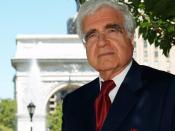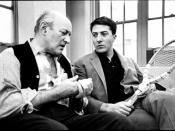A tragic hero can be defined in several different ways. The dictionary defines it as a "a literary character who makes an error of judgment or has a fatal flaw that, combined with fate and external forces, brings on a tragedy". Shakespeare's definition is similar, but the tragic heroes in his literary works are in some sense of high estate or nobility and also realize their flaw before dying. Some examples of tragic heroes in Shakespeare's works are Macbeth, Julius Caesar, and Hamlet. Arthur Miller's definition of a tragic hero differs from these other definitions, though. He does not believe it is necessary for the hero to maintain a high rank in society for his death to be considered tragic. In his opinion, the common man is just as likely to possess the same tragic flaws as the highbred and the kingly. The tragic hero also does not recognize his flaw before dying like in other tragedies.
In Arthur Miller's Death of a Salesman, Willy Loman can be considered a tragic hero since his tremendous pride seen in many different situations, along with fate and external forces, brought on his death.
To begin, Willy's pride is seen in his refusal to quit in his attempt to be a successful salesman. Many people try to discourage him from his dream, but he's too prideful to quit. One example of this is seen when Willy's brother, Ben, asks Willy to join him in Alaska and work with him. Willy doesn't accept the offer, though, because he still has hopes of dying a well-like salesman. Furthermore, Willy's son, Biff, also tries to encourage Willy to give up his dream. Biff knew he wasn't made to be a salesman and that Willy was never going to be happy until he...


